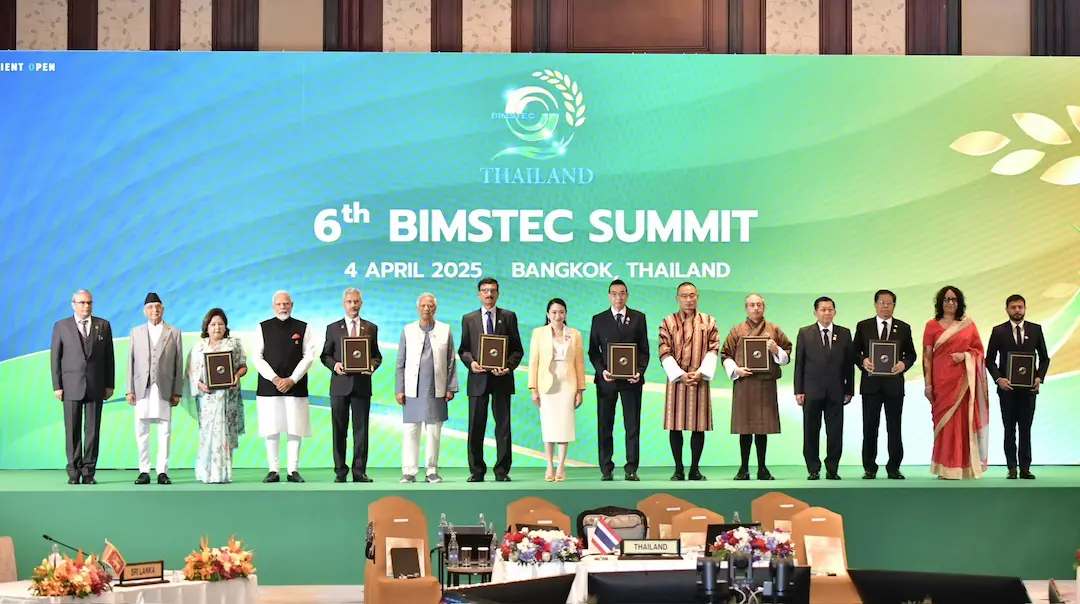Diplomatic Correspondent
Published:2025-04-05 19:53:48 BdST
BIMSTEC Summit concludes with key milestones in regional connectivity, economic integration
BIMSTEC member states celebrated the successful conclusion of the Summit, where six crucial agreements were endorsed, laying the groundwork for enhanced regional cooperation and economic growth under the "Bangkok Vision 2030."
Diplomats and foreign affairs experts have termed the “Bangkok Vision 2030” as a strategic blueprint for regional development, focusing on economic integration, connectivity, and human security.
They said the 6th Summit in Bangkok has successfully concluded, reaffirming the commitment of member nations to strengthen regional connectivity, improve disaster response, and foster deeper collaboration to create a more resilient community.
The summit culminated in the adoption of six key outcomes. Among the most significant was the BIMSTEC Bangkok Vision 2030, a strategic roadmap outlining goals for economic integration, enhanced connectivity, and human security by 2030.
The Bay of Bengal Initiative for Multi-Sectoral Technical and Economic Cooperation (BIMSTEC) comprises seven countries of the Bay of Bengal region, namely Bangladesh, Bhutan, India, Myanmar, Nepal, Sri Lanka, and Thailand.
The 6th Summit was attended by Chief Adviser of Bangladesh Prof Muhammad Yunus, Prime Minister of Bhutan Dasho Tshering Tobgay, Prime Minister of India Narendra Modi, Chairman of State Administration Council and Prime Minister of Myanmar Senior General Min Aung Hlaing, Prime Minister of Nepal KP Sharma Oli, Prime Minister Sri Lanka Dr Harini Amarasuriya and Prime Minister of Thailand Paetongtarn Shinawatra.
The summit’s declaration reiterated member states’ commitment to these shared objectives. In addition, a new set of Rules of Procedure was approved to streamline and improve the effectiveness of BIMSTEC operations.
The Report from the BIMSTEC Eminent Persons’ Group, which includes recommendations aligned with the Vision 2030, was also endorsed.
A major development was the signing of the Agreement on Maritime Transport Cooperation, which aims to bolster maritime connectivity between South and Southeast Asia, thereby reducing trade costs.
Furthermore, the summit endorsed a Joint Statement on the recent earthquakes affecting Myanmar and Thailand, reaffirming solidarity and a commitment to strengthening regional disaster response systems.
Key outcomes included the adoption of:
- Bangkok Vision 2030: A strategic blueprint for regional development, focusing on economic integration, connectivity, and human security.
- The 6th BIMSTEC Leaders' Summit Declaration: Reaffirming member states' commitment to the vision.
- Rules of Procedure for BIMSTEC Mechanisms: Establishing a robust operational framework.
- Report of the Eminent Persons Group on the Future Direction of BIMSTEC: Providing strategic recommendations.
- The Agreement on Maritime Transport Cooperation: Enhancing maritime connectivity and trade.
- The Joint Statement on the Impact of the Earthquakes in Myanmar and Thailand: Expressing solidarity and commitment to disaster relief.
The agreements are expected to bring tangible benefits to member states, particularly in terms of trade facilitation and disaster resilience. The maritime transport agreement, for instance, aims to reduce shipping costs and improve supply chain efficiency.
Unauthorized use or reproduction of The Finance Today content for commercial purposes is strictly prohibited.


